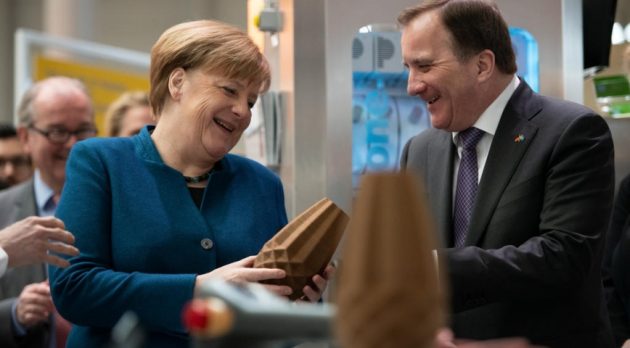
Industry 4.0: What’s new at the fair?
Jayson Myers
Industry Innovation & Technology Manufacturing automation digital Hannover Messe Industry 4.0 manufacturingHannover Messe is the place to go to see the latest in digital factory, industrial systems, robotics and more.

German Chancellor Angela Merkel and Stefan Lofven, the Prime Minister of Sweden.
PHOTO: HANNOVER MESSE
Few words properly describe Hannover Messe, the largest industrial fair and showcase for advanced manufacturing in the world. Overwhelming and awe-inspiring come close.
The fair spreads over 27 halls covering the area of almost 90 football fields. Each year, a quarter of a million people pass through the gates during its week-long run. Many come in suits because the fair is a place where technologies and best practices in innovation management are discussed and business deals are made. There are also young attendees – students, apprentices and today’s technology experts. You can feel the buzz.
Then there’s the technology itself. Hannover is the place to go to see the latest in digital factory and IT solutions, industrial controls and automation systems, robotics, energy systems, motion and drives, leading-edge manufacturing research and start-ups. There are robots playing ping-pong, robotic birds flying overhead, even robots playing the piano. All very neat, but the real magic is in the range of high-tech solutions on display that cover every aspect of product design and development, production systems and connectivity. You come away from Hannover thinking that if a technology solution doesn’t already exist, it soon will. This year’s fair took place during the first week of April. It didn’t disappoint (except for difficulties in finding a reasonably priced hotel nearby). I was impressed by the opening ceremony.
German Chancellor Angela Merkel spoke, along with Stefan Lofven, the Prime Minister of Sweden, this year’s guest country. Both talked about technology trends and the future of manufacturing. Their speeches were well informed, strategic and weighty in technical details. Both spoke passionately about how technology is transforming manufacturing, what governments need to do to encourage innovation, and the need to ensure economic benefits of next generation manufacturing are shared broadly across society. I left the evening event thinking about how important and yet how fragile our open economy is, and that we need to hear from more far-sighted political leaders as knowledgeable as Merkel and Lofven.
Each year the fair highlights leading-edge technologies. Last year, it was all about additive manufacturing and virtual and augmented reality. This year the focus was on developments in machine learning, cobots and factory-wide 5G networks. Workshops, which usually set the stage for what’s next, covered smart materials; smart products and production processes; scalable, smart factories; customer-driven value networks; end-to-end life-cycle engineering for products and production processes; and new ways of generating revenue through data-based services.
Hannover demonstrates that the technologies of the future exist today. Whether or not they can be deployed in a profitable and manageable way remains open to question. Will it be possible to find the skills sets or business partners needed to operate at an optimal level?
In a way, that was what Merkel and Lofven were also saying. As it is with public policy, a lot more than technology needs to be considered when making decisions about the future of any business. The political leaders of Germany and Sweden emphasized technology is simply a tool. They reminded everyone advanced technologies will demand new ways of working, new business partnerships, plus new technical and managerial skills. The Hannover fair amply demonstrates that the tools at our disposal today are both potent and potentially game changing. But the face-to-face meetings, the workshops and business discussions that take place at the fair are really the most valuable reasons for attending. They draw attention to the fact it’s how advanced technologies are managed that really counts.
Canadians are an important part of the discussion. They were prominent at the fair with the Government of Quebec leading a delegation of 140 business leaders. Another 20 manufacturers from Atlantic Canada participated in a delegation and a number of technology companies displayed their latest industry solutions. Canada was also highlighted throughout the first two days of business meetings as a preferred country for European companies to find technology and business partners in advanced manufacturing.
We should pay more attention to what happens in Hannover each April. What’s new at the fair usually sets the standards for manufacturing not only in Europe but around the world.
Hannover Messe takes place from April 20 to 24 next year. It’s well worth a visit. Just book your hotel room well in advance!
Jayson Myers, the CEO of Next Generation Manufacturing Canada, is an award-winning business economist and advisor to private and public sector leaders. E-mail jayson.myers@ ngmcanada.com. Visit www.ngmcanada.com.
